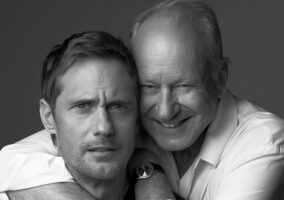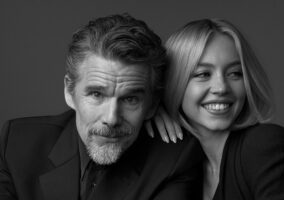This time every year, we pay tribute to women in Hollywood with covers, stories, and portfolios dedicated to an entire firmament of stars. But in this moment, that celebration feels a bit more charged. In a year that’s been bruising for women as a whole, we’ve seen a welcome proliferation of female roles on- and offscreen, from Michelle Yeoh’s powerful turn in Everything Everywhere All at Once to Issa Rae’s entrée into what she has called her “mogul era.” It’s a testament to the power of representation: These women reflect the strength and determination we all want to channel in our own lives.
It’s also the five-year anniversary of the #MeToo movement. Since then, changes have rocked the entertainment industry, opening doors for a diverse group of female actors, screenwriters, directors, and producers. Case in point: Two of our honorees—Olivia Wilde and Zöe Kravitz—have joined the still mostly male ranks of film directors in the years since. Sydney Sweeney points to the use of intimacy coordinators as a sign of progress. Anne Hathaway talks about the power of an all-female set: “I remember having a distinct feeling: Oh, this is what it’s like to be a man in Hollywood.”
Still, that doesn’t mean a world-altering shift has occurred. Sigourney Weaver weighs in on the industry’s ever-present agism: “How often do you hear from a woman in her seventies about her love life, about anything?” Another thing that hasn’t changed: the fact that women in Hollywood, especially women of color, are still subject to unfair scrutiny. As Ariana DeBose says, “There have been insinuations that I was given an Oscar because I’m queer and because I am an Afro-Latina…. We wouldn’t have had conversations around my identity if my work had not first been exceptional.”
If there’s one thing that unites this incredibly talented group of women, whose work spans genres and continents, it’s that they are all fiercely determined to reach their dreams. Here, our eight cover stars tell their Hollywood stories in candid interviews about the roles that changed their lives, the expectations they’ve defied, and the women who have helped them along the way.
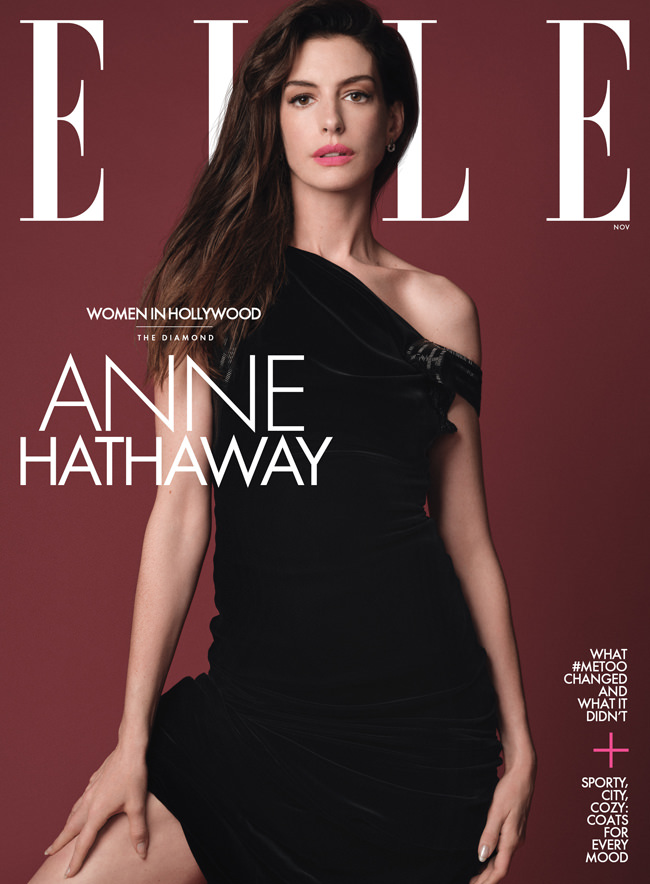
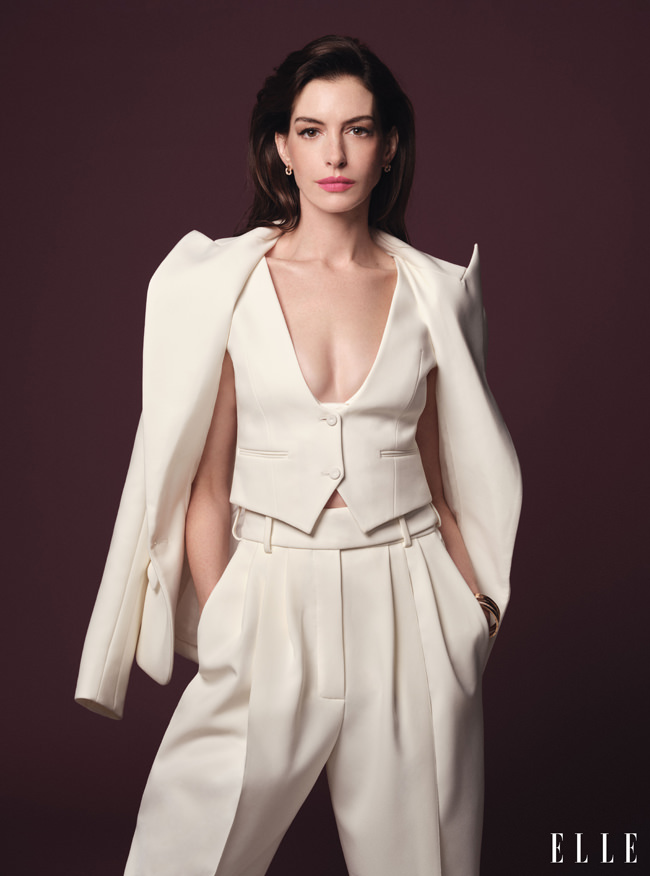
On the positive reception she received at Cannes this year and being in a place where she could actually enjoy it instead of being stressed out: “You plant seeds in your life and then there come these moments where you harvest them—Cannes felt like a little bit of a harvest. In the beginning of my career, I was so worried about messing up that I missed a lot of great moments because I was so stressed out. I’m at a point in my life now where I know having a first time at something remarkable like that—it’s the only time it ever happens. And being in a place where I could enjoy it felt like a really positive development… I have worked too hard on seeing myself with kinder eyes to give away my peace to those who haven’t found it for themselves yet. So I do my best to not be afraid of what others might say and just focus on enjoying my life.”
On working on the all-female Ocean’s 8: “My first day of shooting was the day after the 2016 election. We all got our hair and makeup done in the morning and then watched Hillary’s concession speech—and then cried, and then redid our hair and makeup, and then worked a 20-hour day. Because women are really tough. I remember looking around going, Wait, why have I never been here before? Like, why has it taken this long into my career to have this many women on set? And then I remember having a distinct feeling: Oh, this is what it’s like to be a man in Hollywood. Wherever they go, they’re in a pack; there’s so much ease in this. And I just wanted more of it. I thought, I have to make this an intention in my career. To work with other women and to create opportunities for as many women to work together.”
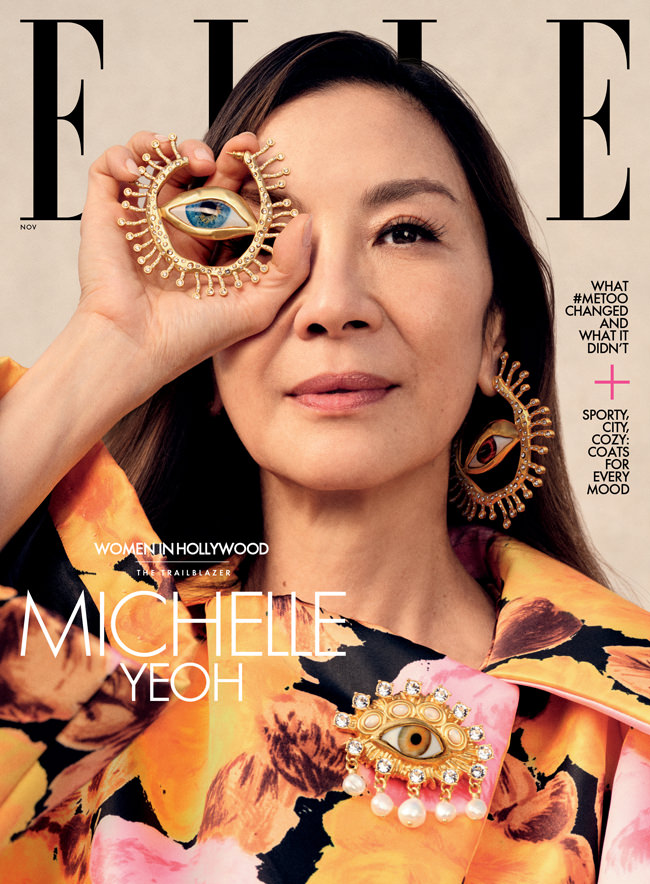
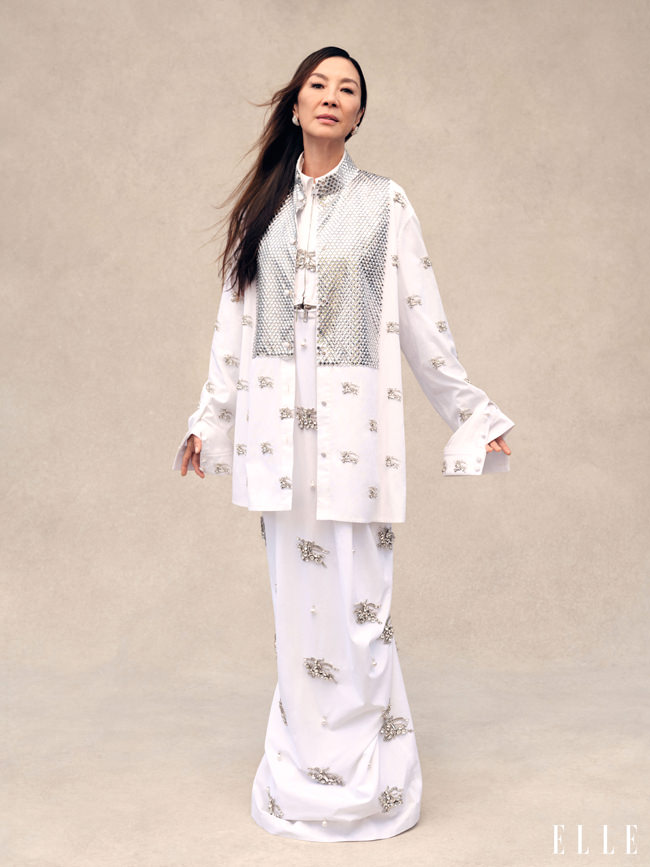
On crying during the Everything Everywhere All at Once press tour: “[Those emotions] came from a place of, When you know that there’s so much you can do and people keep saying, ‘Oh, but you’re in your fifties.’ They take away all these opportunities from you, and you’re trying to hold on. It hit me: In this one movie, I was suddenly presented the opportunity to do all these things and to show you guys what I am actually made of. It felt very emotional: ‘Wow, I actually managed to do it. And they actually like it.’”
On defying expectations: “I have never been the one to say, ‘Okay, I’ve been told that I can’t do it, so I won’t do it’—especially if I think that I can. We first have to believe in ourselves. We cannot allow people to nudge us. I know I am capable of more, and let me prove it to you. I’m like a pit bull. I’m going to defeat you. I’m just going to find a way and work until I get over it. The worst thing is that you try to push fear aside and pretend that it’s not there. I like to face it head on. We as women are just asking for equal opportunities. Let us show what we can do. I did not set out to fight against stereotypes; I only forged that path because I felt that I didn’t want to be put in a box.”
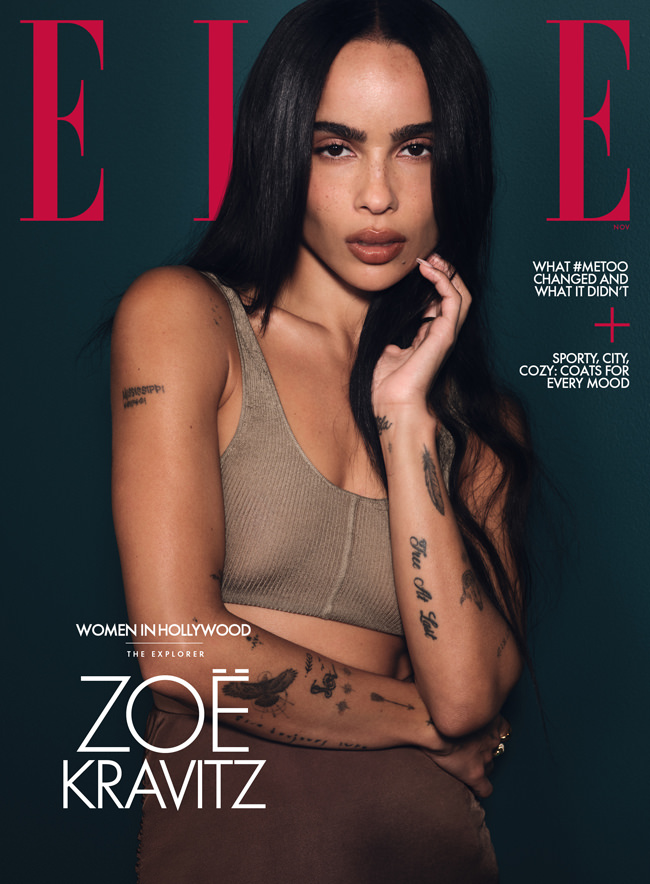
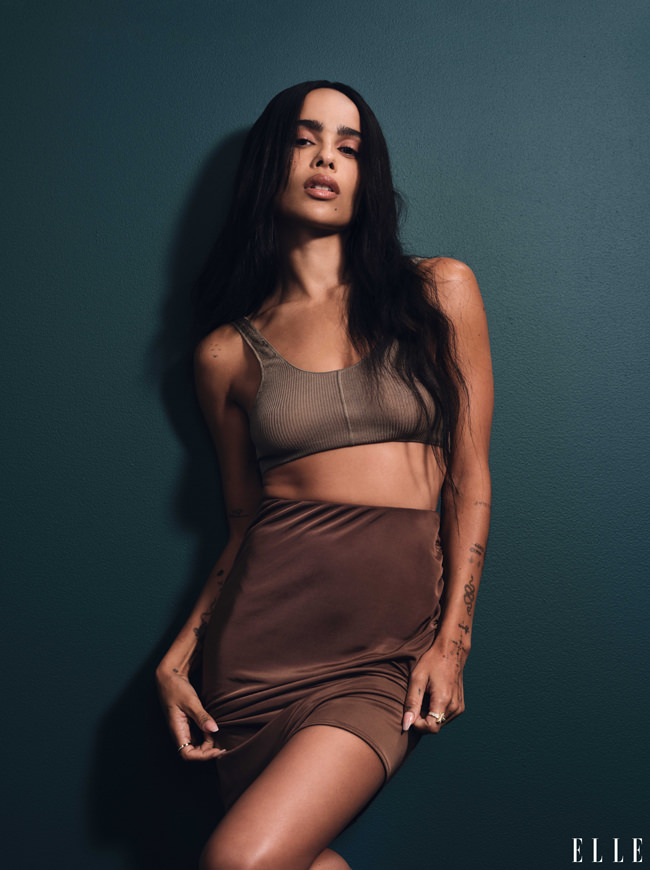
On cowriting Pussy Island with her writing partner E. T. Feigenbaum in 8- to 12-hour shifts and deciding to direct the film: “The story has changed many times. I started writing it before Harvey Weinstein was exposed, so the world was different. It came from a very different place, and it did start very much like an angry feminist script,” she explains. “Then, as the world changed and the conversation evolved, I got to sit back and watch.” While Kravitz didn’t initially plan to direct the film, it became clear that it wouldn’t work any other way. “I just didn’t know anyone else who I felt comfortable handing it over to,” she says. “When you work on something for so long, you see it in your mind’s eye, and I didn’t know who else would understand it the way that I did. If you dream it into reality, it feels like giving birth in a way.”
On her use of social media and in general how celebrities use social media: “I didn’t really sit and think about [using Instagram to call out Hulu for canceling High Fidelity], which is sometimes my problem. I’m a very impulsive person. That’s one of the problems with social media in general. You can just do something without thinking. There’s good things about that, in terms of the fact that that was my honest opinion in that moment and still kind of is, and I said it. But we’re also living in a time where it’s good to be thoughtful about what you say. Social media is a big experiment that we’re all participating in, and to pretend like we understand it is a joke. I have had my ups and downs with it. I’m sure it’s helped my career in some ways, but I also think it’s hurt it. With actors, it’s difficult because I think we give too much information [about ourselves] and it makes it difficult for us to disappear into roles. The actors that I grew up watching, I didn’t know anything about them. That’s part of what made them so interesting… When something happens, people expect celebrities to write about it. What if we’re still processing? What if we don’t have enough information and we don’t know how we feel yet? Maybe we’re at home crying in our bedrooms and talking to our friends.”
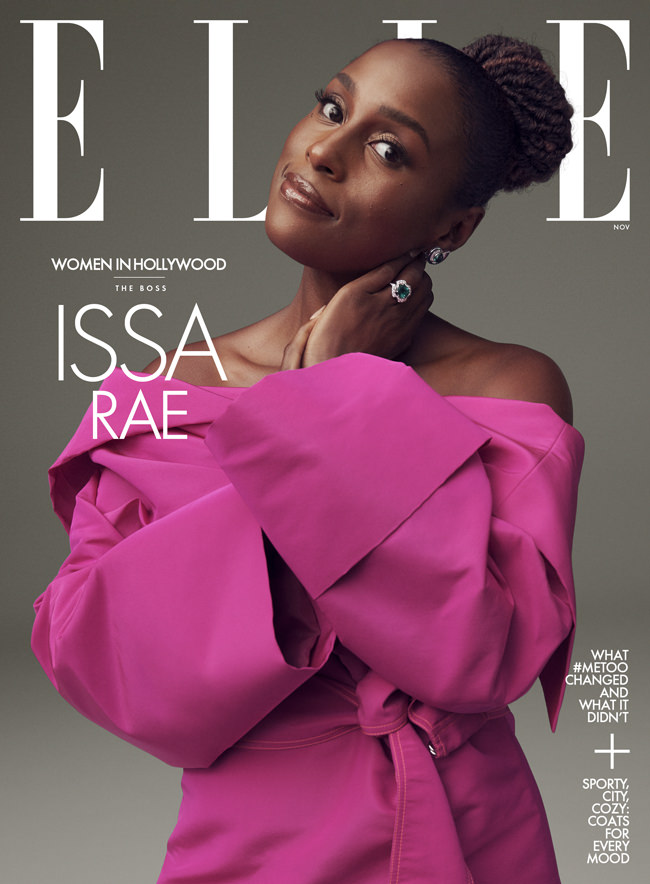
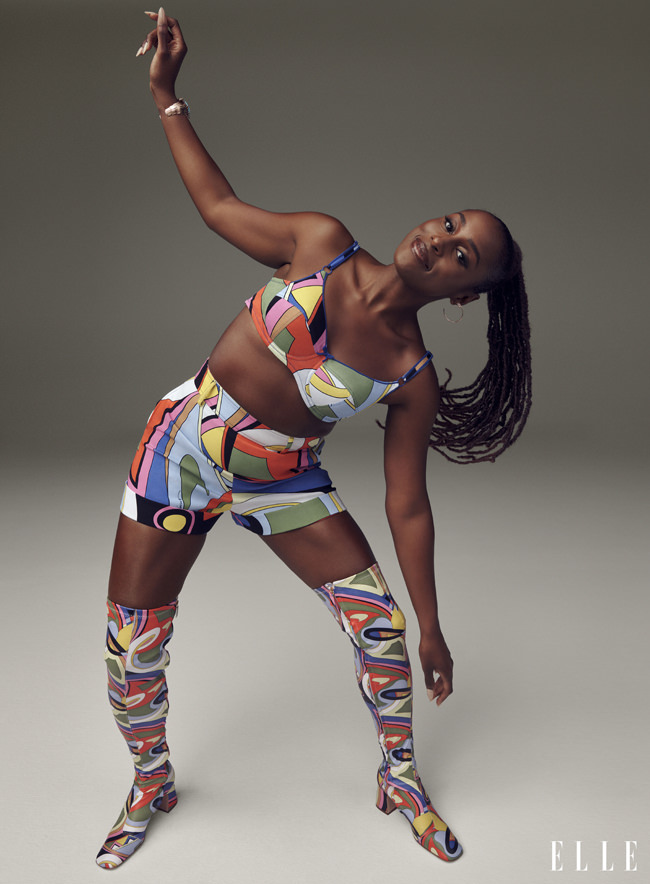
On what has changed in Hollywood post-#MeToo and what more needs to be done: “Sadly, not much. It feels like we’re regressing, depressingly so. There are just too many enablers for there to be real change. People have to be held accountable. There have to be legitimate consequences. Hollywood is very bad about consequences. It’s literally the worst industry when it comes to punishing people for misdeeds, because money will always reign supreme. That’s something that, even by working in this industry, we’re enabling. So it’s hard. What I have realized is that I can control my own environment and who I work with. I can hold people accountable within my world and my bubble. I don’t have to work for everybody. All money isn’t good money. All people aren’t good people…It starts with a backbone. While I don’t support people jumping to conclusions and I think it’s entirely fair for investigations to happen, I think it’s extremely important to, like the mantra says, ‘Listen to women.’ I’m gonna be real, the stuff that’s happening with Ezra Miller is, to me, a microcosm of Hollywood. There’s this person who’s a repeat offender, who’s been behaving atrociously, and as opposed to shutting them down and shutting the production down, there’s an effort to save the movie and them. That is a clear example of the lengths that Hollywood will go to to save itself and to protect offenders. So, don’t do that, and women may be able to thrive. They won’t have to live in fear of keeping silent because it’ll ruin their careers. It’s just a constant pattern of abuse that’ll only persist if Hollywood continues to insist on being this way.”
On her only-in-Hollywood moment: “I was at the Golden Globes sitting at a table with the cast of Big Little Lies. Laura Dern was casually, unbeknownst to me, pitching the president of HBO her next idea. It was him being like, ‘Okay, I love the idea. Who’s gonna write it?,’ then her pointing to me, and then us selling a show together. That, to me, will always be an only-in-Hollywood moment. Now we just have to make the show.”
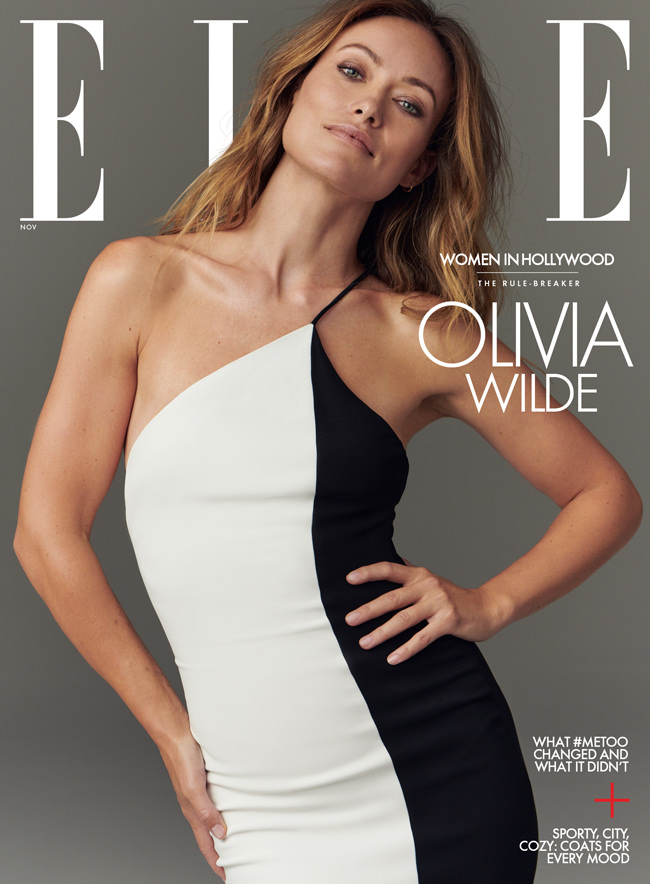
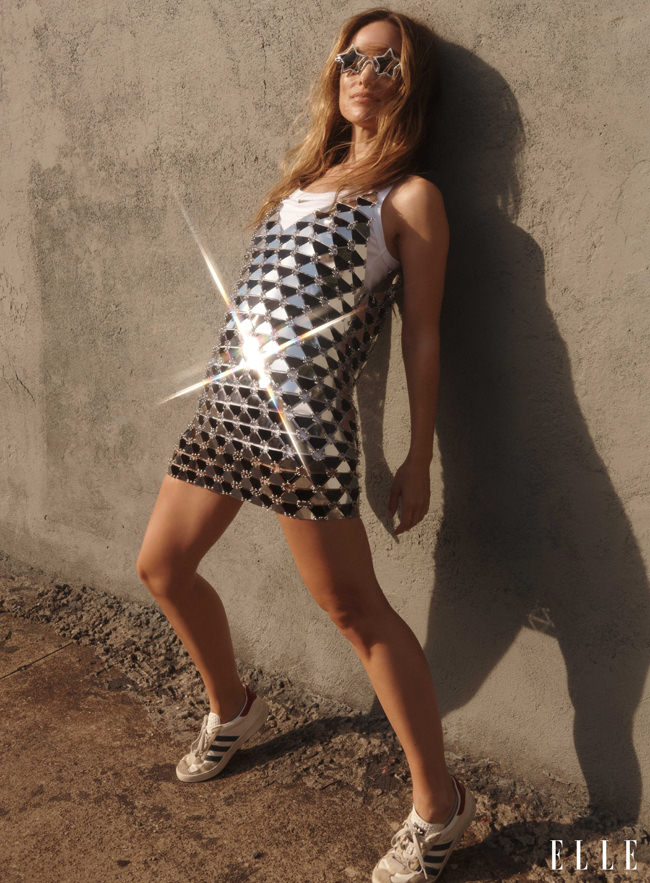
On her upcoming projects and what they have in common, along with challenges she faces in her current movie promotion of Don’t Worry Darling: Meanwhile, Wilde is developing, and set to direct, a Kerri Strug biopic with the working title Perfect, and reportedly has a deal with Sony to direct a hush-hush, female-centric Marvel feature. “A few of the things I have in development are about the raw determination of women. Clearly, I idolize women who survive a system that they feel challenged by.” Perhaps it’s something she can relate to as she navigates this latest chapter. “It is shocking to see so many untruths about yourself traded as fact,” she says. “Florence had a really wise comment that we didn’t sign up for a reality show. And I love that she put it that way, because it’s as though the general public feels that if you are making something that you’re selling to the public, you somehow have accepted that your life will be torn to shreds by a pack of wolves. No, that’s actually not part of the job description. Never was.”
On Don’t Worry Darling’s complicated feminist perspective: “I’m very curious about our collective complicity in [upholding] the patriarchy. I found myself seeing a lot of content that was struggling to address feminist issues and instead becoming either really simplified or overly didactic. I had no interest in making a feminist parable that was judgy or that defined men as bad and women as good. I was much more interested in that tense space where we recognize our own participation in the system that objectifies us.”
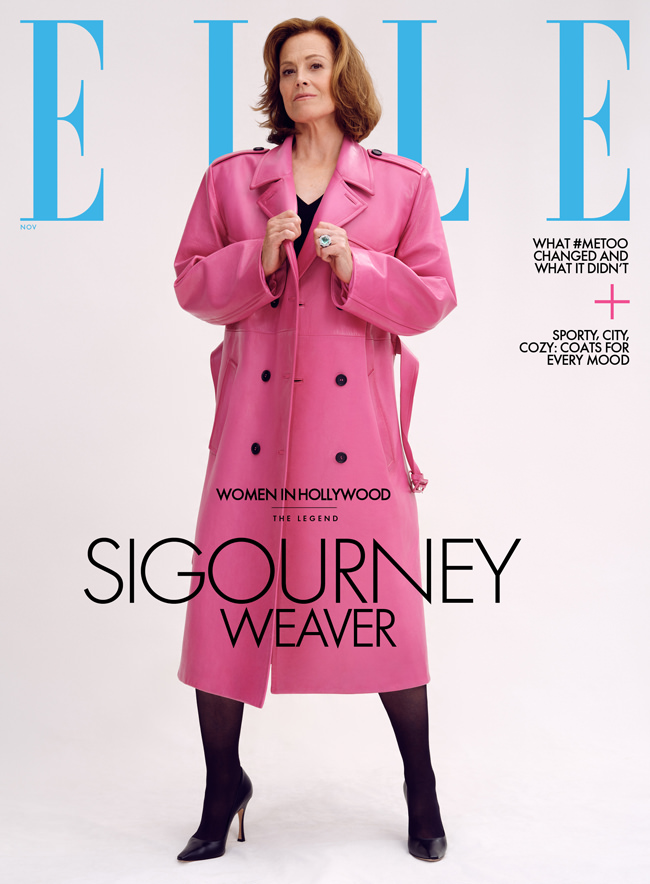
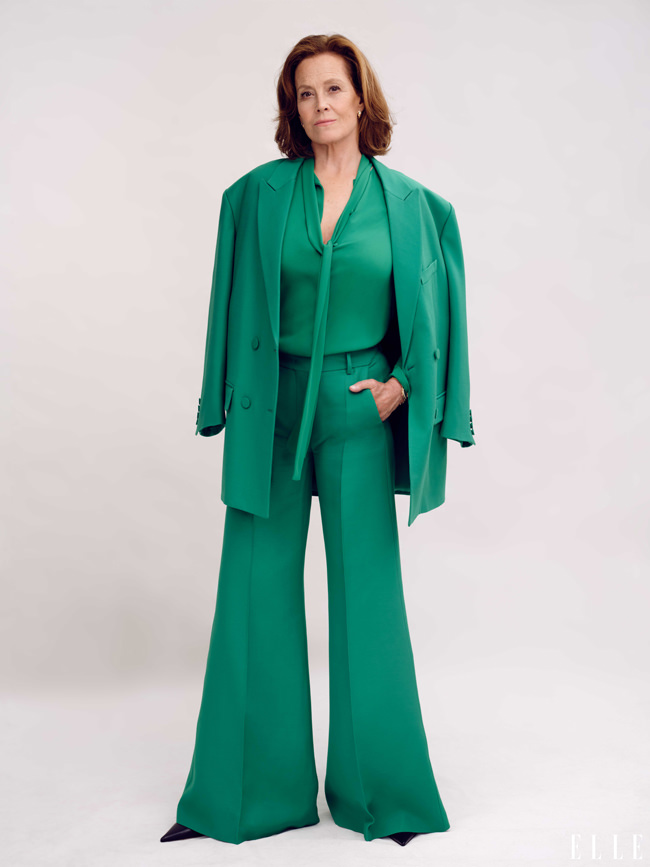
On her fascination with how movies are made and why she loves the industry: She thinks back to the set of Aliens in 1985, being the sole person in front of the camera but looking out on some 300 crew members working behind it. “It blew my mind,” she recalls… She still takes joy in the teamwork. “Besides my husband and daughter, the love of my life has been this job,” she says. “I think it’s because it’s with people—it can only happen with a family of people. And it’s sometimes terribly hard, and miraculous things can come out of this interaction. I find that just as exciting now as I did at the beginning.”
On her upcoming movie The Good House, the rare grown-up movie (call it a rom-dramedy) to earn a theatrical release in 2022: It stars Weaver as Hildy Good, a real estate broker juggling small-town intrigue, slow-to-launch daughters, and an escalating fondness for Merlot. “How often do you hear from a woman in her seventies about her love life, about anything?” she says. “That Hildy was given a platform like this, that I was given a platform, I feel that’s rare, but becoming less rare because people are smart. And they like to see us geezers who’ve been around forever and have a toolkit and can go to work and make something happen. I do feel we’re in a very lucky time now where older characters are heard from more,” Weaver adds.
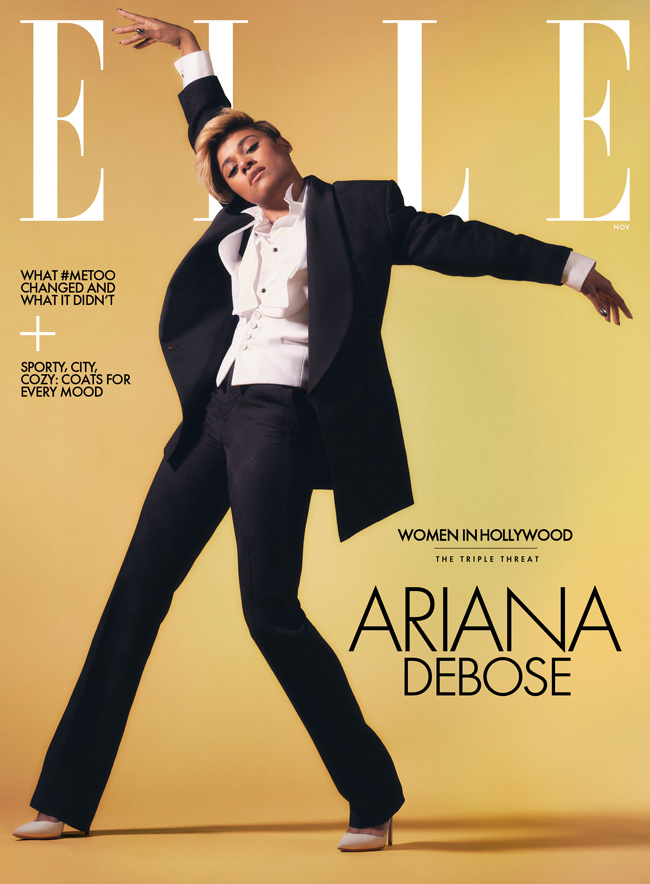
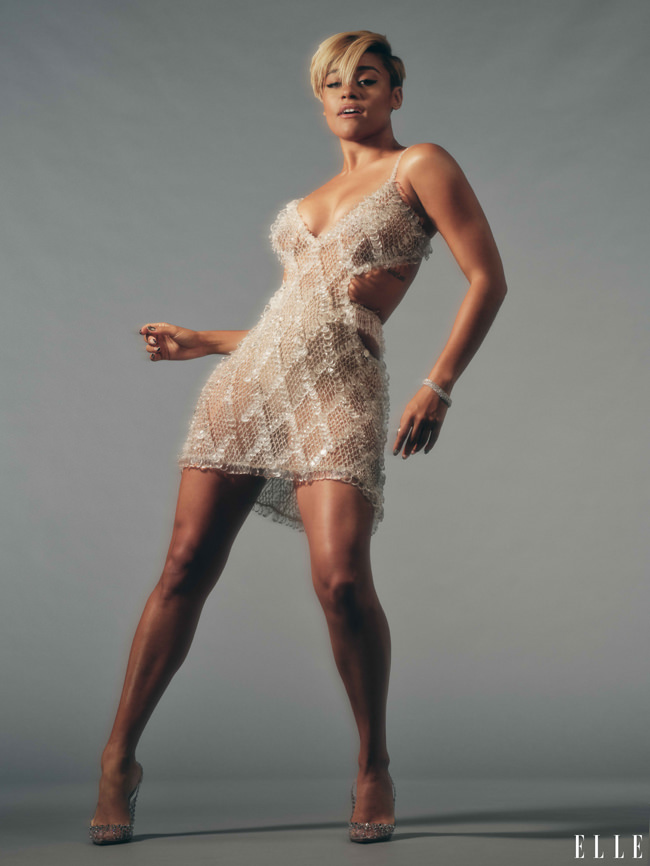
On defying haters and earning her accolades: “There have been insinuations that I was given an Oscar because I’m queer and because I am an Afro-Latina. And that’s haterade. That’s just haterade. And I know that. We wouldn’t have had conversations around my identity, or any of the labels associated with my name, if my work had not first been exceptional. And I’ve always said, I don’t believe I should be handed anything. I want to earn my seat at the table. I don’t believe in everybody getting gold stars just because you tried. I want the gold star because I busted my balls to be where I am, and I’ve done the work, and I trained, and I took the private lessons, and I humbled myself. I fell on my face multiple times in the 10 years it took me to get to where I am. Hell, I took a voice lesson yesterday. Yesterday.”
On an interesting ‘only-in-Hollywood’ moment of hers: “I was cornered in a bathroom at a Hollywood event and someone told me I took their job from them. And that, to me, was an only-in-Hollywood moment. That never happened to me in high school— no one ever cornered me and said, ‘You took my boyfriend.’ I guess I didn’t have that problem.”
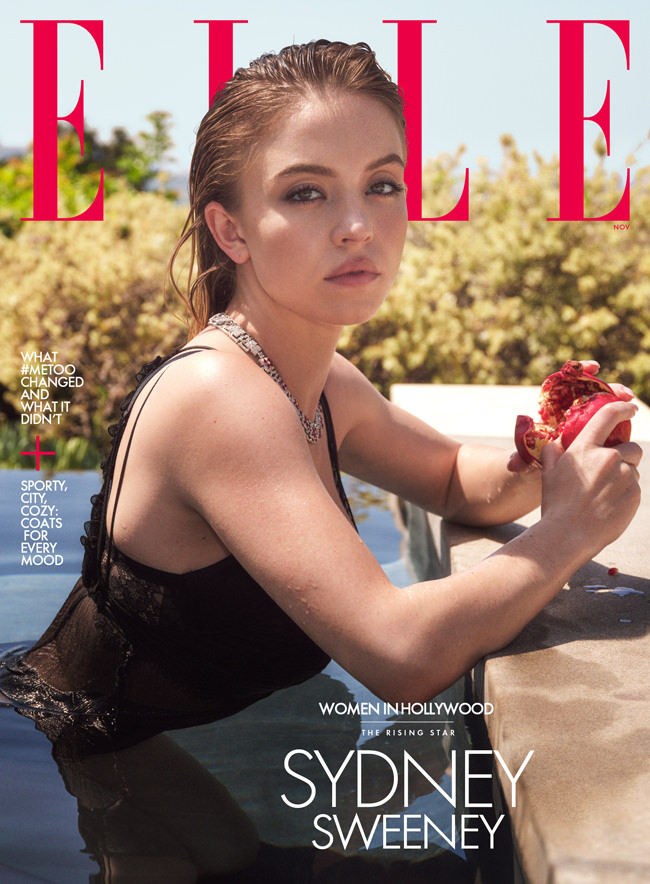
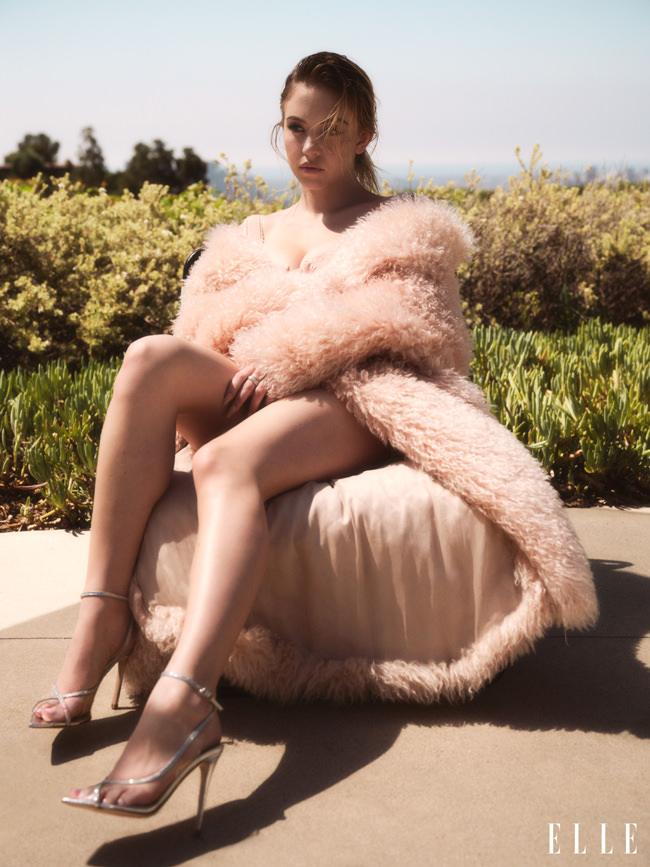
On defying expectations and not giving up: “In high school, whenever I’d go home [between filming], I would feel so insecure and judged. People would be like, ‘When are you gonna get a real job?’ Or, ‘When are you just gonna come home and get married and have a real life?’ And I knew that if I ever gave up, I wouldn’t be able to live with myself. I wasn’t going to allow myself to quit, or people to tell me that I’m not good enough or I wasn’t going to make it. I was going to keep working as hard as I possibly could to achieve my dreams.”
On how her comments to the Hollywood Reporter about not being able to take a six-month break were misinterpreted: “I was asked if I wanted to have a family and I said yes. And then I was asked why I didn’t have one yet, and I was like, I don’t have time to take even, like, a six-month break. Like, I don’t have time to be able to start this family. I’m working so much and I’m focusing on that right now. And so it was kind of skewed with the public and taken out of context, which was insane to watch and kind of disappointing, too, because I think that being a mother, and a working mother, is really important. I really want to achieve that one day. So I was disappointed that people took my words and changed them [to serve] their own agenda.”
[Photo Credit: Olivia Wilde and Issa Rae by Cass Bird, Sydney Sweeney, Sigourney Weaver, Michelle Yeoh, Ariana DeBose, Zoë Kravitz, and Anne Hathaway by Sharif Hamza/Courtesy of ELLE Magazine]
Dwayne Johnson with Noah Centineo, Quintessa Swindell, Aldis Hodge, and Sarah Shahi at the BLACK ADAM Los Angeles Premiere Next Post:
Claire Foy, Ben Whishaw and Jessie Buckley at the BFI London Film Festival WOMEN TALKING Premiere
Please review our Community Guidelines before posting a comment. Thank you!

